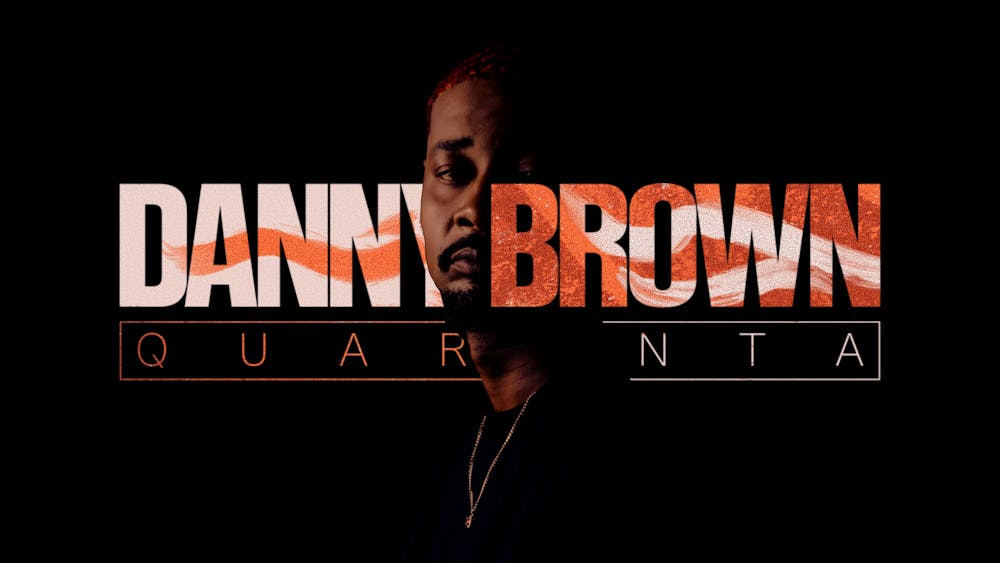“This rap shit done saved my life, and fucked it up at the same time,” raps Danny Brown in the opening line of his sixth studio album, Quaranta. Brown has had a long complicated relationship with rap music. A true student of the game as apparent on his comedy podcast, The Danny Brown Show, the 42–year–old Detroit rapper has an almost encyclopedic knowledge of hip–hop music.
Brown often says that rap is the only thing he’s good at, and the only job he ever wanted. “30,” the emotional closing track off of Brown’s 2011 breakout mixtape XXX (pronounced “triple x” or “30”), functions as an abbreviated biography, recounting Brown’s past and forecasting an early death in the arms of a “blonde, blue eyed 20-something” due to drug overdose.
In the song, Brown says “I never learned to rap, always knew how. Ever since a n**** eight, knew what I would do now.” While other kids said they wanted to be an astronaut, or a doctor, Brown told his teachers he was gonna be a rapper (I’m reminded of the opening skit in Snoop Dogg’s “Gz and Hustlas,” where a teacher asks a fictional, kindergarten-aged Snoop what he wants to be when he grows up. His response: “I’m gonna be a motherfucking hustler; you better ask somebody.”)
At age 18, Brown became a drug dealer instead, and put his rap dreams on the backburner until an eight–month stint in jail. After his release in 2002, he decided to revisit his passion for music. However, Brown didn’t exactly fit the sound or image of 2000s mainstream hip hop (think of the music video for Soulja Boy’s “Crank That” .) His style consisted of straightened goth-kid-style swoop hair, skinny jeans, leather jackets, and missing front teeth–which he lost in a bike accident. What’s more, Brown’s unusual rap voice, which fluctuates between high-pitched, manic yelps and a menacing gruffness (earning him the nickname “The Hybrid”), was a hard sell to music executives. For almost a decade, Brown remained unsigned and had to cope with the distressing difference between his enthusiasm for rap and the industry’s enthusiasm towards him.
By the time he released XXX and signed with the New York electronic label Fool’s Gold, Brown was 30 years old–an age that’s essentially considered senior citizenship in the rap game (Nas started recording Illmatic when he was 17.) Brown’s album titles: XXX, 2013’s Old, and now Quaranta, while at once serving as playful reminders of Brown’s uniqueness in a rap scene that’s plagued with clones, also betray the sharp bitterness he feels for being ignored by the industry and living through his 20s feeling like a total failure.
Quaranta means 40 in Italian–both Brown’s age at the time of recording the album and a homonym for “quarantine.” The project is intended as the long-awaited follow up to XXX. As if by fate, Brown’s circumstances at the time of recording Quaranta somewhat mirror that of XXX, causing him to dive deep into the same feelings of inadequacy and trauma that rushed violently to the surface on the second half of XXX with tracks like “DNA” and “30.” On Quaranta’s third track, titled “Ain’t My Concern,” a song mostly about his distaste for the current state of rap, Brown mentions how his aunt died while he was on tour for his 2019 album uknowwhatimsayin¿. Brown’s family asked him to put up money for a funeral, but due to his drug use and the tour being cut short by COVID–19, he couldn’t pay. In an interview for the Guardian, Brown reflects: “I didn’t know how to tell them. They knew I’d had the money. But I’d just pissed through it, getting fucked up and sniffing it up. I felt like a failure.”
Around the same time, Brown broke up with his fiancé, forcing him to go through the lockdown alone. Isolated in his apartment in downtown Detroit and crushed by the pain of his recent failures, he turned to drugs and alcohol, spiraling deep into depression. At his lowest, Brown admits he was effectively suicidal, taking drugs without testing them, well aware that they might be laced with deadly amounts of fentanyl.
Unlike XXX, which distorts Brown’s pain and insecurity into bombastic, satirical club bangers, Quaranta is more lowkey—if XXX is the party, then Quaranta is the therapy session the next morning. Brown mostly abandons his signature high-pitched inflection, opting instead for a lower tone that’s usually reserved for serious subject matters. On “Down Wit It,” Brown’s voice is strikingly low and melancholic, almost approaching a whisper. Over a spacious, nocturnal beat made by frequent collaborator Paul White, Brown tells the story of his breakup, admitting to both cheating (“got caught a couple times”) and being cheated on (“caught a couple times.”) His confessions are delivered bare, without the slightest hint of subtlety (“Tryna kill my pain, so I drink.”) Knowing that he was suicidal and wrote the album as if it was his last makes these lyrics all the more uncomfortable to listen to.
On another level, all of Quaranta is about Brown’s breakup with rap music. For the chorus, he borrows a line from Geto Boys’ 1991 song “Mind Playing Tricks On Me” (“I had a woman down with mе; but to me, it seemed like she was down to get mе”), connecting his relationship with his fiancé to the '90s rap music he loves and grew up with (one of rap music’s classic traditions is comparing the rap game to a love interest; check out Drake’s “Wu Tang Forever,” my favorite example.) On “Hanami,” Brown confesses that making music just wasn’t fun for him anymore due to the pressures of the industry (“can't have writer's block, might be out on the block”) and his drug addiction. On his podcast, Brown has talked about the regret he feels for going on tour in places like Europe and being unable to leave his hotel room due to horrible hangovers. Oftentimes he got so drunk that he couldn’t remember his own performances.
Last year, Brown announced on his podcast that he was checking himself into rehab, and is now coming up on one year of sobriety in April. He did his first ever sober tour with rapper JPEGMAFIA for their collaborative album SCARING THE HOES, with Brown traveling in a separate car behind the tour bus, fearful that the environment might be a trigger for him. Now that Brown’s head was clear, he suddenly became aware of all the fans showing love and shouting his lyrics back at him during performances. “I actually started to have fun being on stage again,” he said in the Guardian interview. “Doing the shows sober almost became like a therapeutic thing, to just see the people in the crowd smiling and being happy and having a good time. That energy translated to me, so it was like I was getting my fix every day with that.” Brown is set to kick off his Quaranta tour this March. With Brown doing so much better these days, Quaranta, thankfully, reads like a product of its time (much like the quarantine it's named after) rather than a defining statement on his life.
The closing track, “Bass Jam,” possibly Brown’s most intimate and vulnerable song to date, provides some closure for all of Quaranta’s pain and uncertainty. In Quaranta musica therapy session, “Bass Jam” is the breakthrough moment when the root of your decisions and the meaning behind them become clear–if only for three minutes and 43 seconds.
Over nothing more than a looping bassline, kick drum, snap, and some reverb-heavy pads, Brown time travels back to his childhood, recalling all of the music his mom used to play around the house (“Mama played them old school jams on repeat.”) When he had trouble sleeping, his mom played Sade (“a little Sade sent me on my way”) while he dreamed about being a rapper (“dreamin’ ‘bout the that shit i’m doin today.”) Although on the surface Brown is simply telling a story from his childhood, this moment has everything to do with the pain he feels today. Why, if his dreams of being a musician felt so pure and exciting in these childhood moments, have they led him to this point?
The next few lyrics are even more revealing. Brown was born the son of teenage parents; his mother was eighteen when she had him, while his father was only sixteen, and their relationship was far from monogamous–“pops get gone a week, now she pagin' my Dad.” But when he did come back to the house, he “came in with some pizzas like nothin' had happened; Now we just laughin', jammin' to the oldies; Dеalin' with emotions, never hеard, ‘I'm sorry.’” The idea that his family used music instead of words to communicate and share emotion is made even more explicit during the pre–chorus (“play another song, let the music talk for us; have us shedding tears before we get through the chorus.”)
Before I talk about these lines, let’s return to the line that started the album, and this article: “This rap shit done saved my life, and fucked it up at the same time.”Through lyrical storytelling, much like that of the '90s rappers he idolizes, Brown tells us that music saved him because it allowed his family to share their feelings with each other. They didn’t know any other way. (Also, in the context of “Down Wit It,” this story is incredibly poignant, as we can infer that part of the reason Brown has problems with relationships is because of his parents’ unstable relationship and lack of communication.)
What separates “Bass Jam,” which critiques the lack of substance in modern rap, from other oldhead anthems that decry the current state of hip hop like Jay-Z’s “Moonlight” is that the song leads by example, offering up all of the emotional weight that Brown thinks other rappers are missing in their music. These lyrics poke at the core of his character, and it’s apparent that he’s not doing it for us. Music isn’t just how he communicates with others; it’s also how he learns and understands more about himself. That’s why, when he writes a song, he doesn’t hold anything back. Although Brown is often labeled an outsider–a weirdo, alternative internet-rapper–he’s as real as it gets.







